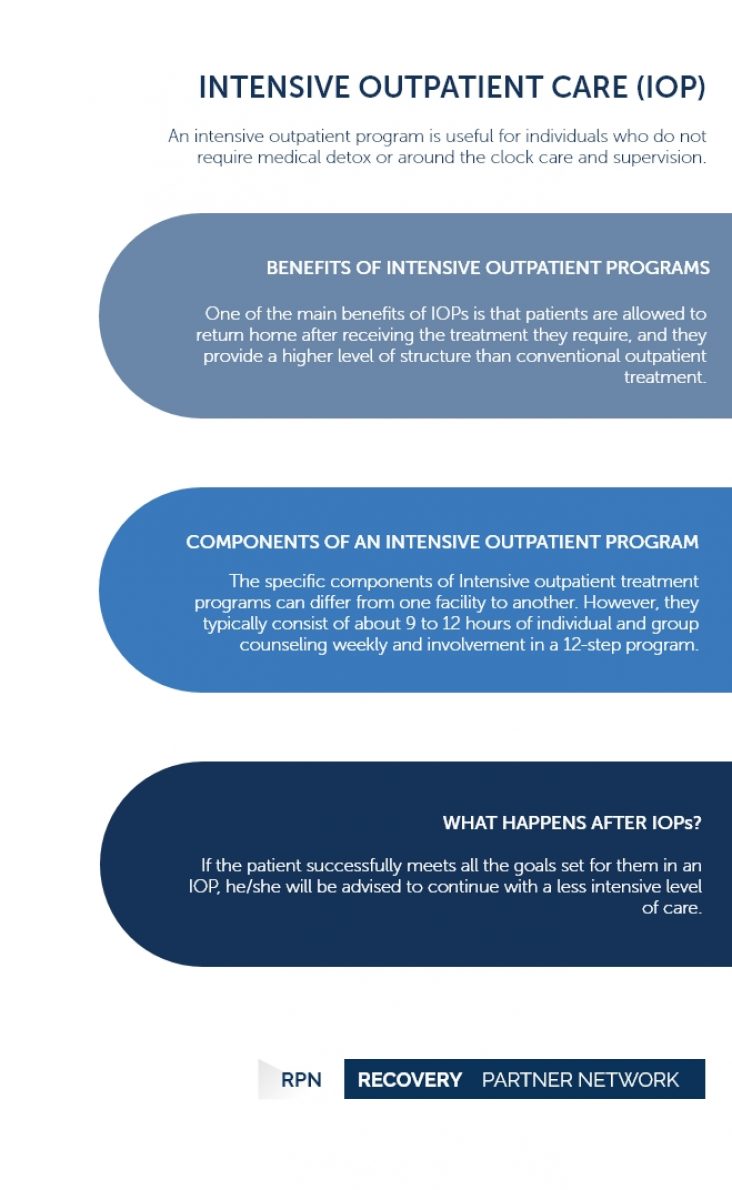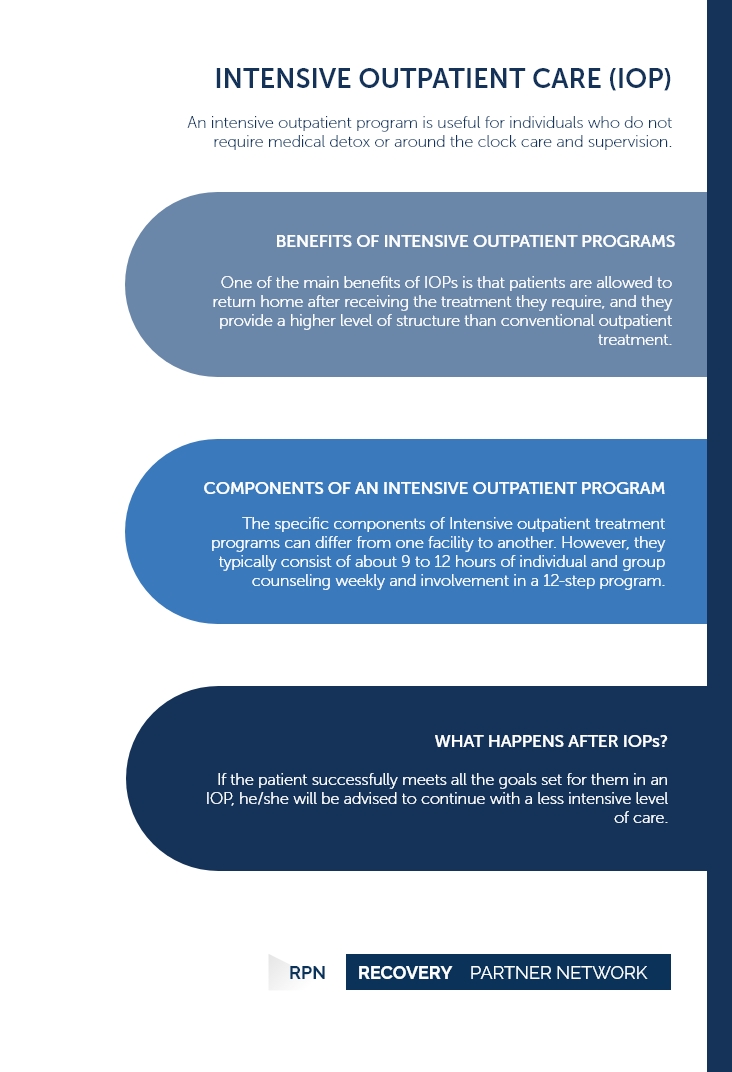An intensive outpatient program is useful for individuals who do not require medical detox or around the clock care and supervision.
Intensive Outpatient Care (IOP)
Intensive outpatient program | Table of Contents
What is an Intensive Outpatient Program?
An intensive outpatient program (IOP) is a comprehensive addiction and co-occurring disorder treatment program that is delivered on an outpatient basis. IOPs often require patients to undergo multiple sessions that last a few hours per week to engage in counseling services, 12-step support groups, and relapse prevention programs.
Intensive outpatient programs are often recommended for:
- Adults with mild-to-moderate substance use problems that may not need medically-assisted detoxification.
- Patients who have previously received treatment at an inpatient rehab and require a step-down standard of care.
- People that have everyday commitments or employment that they cannot leave.
IOPs establish a treatment strategy with measurable, defined milestones to demonstrate success, and when these milestones are reached, the time commitment required from patients reduces per week. Some programs provide several sessions that last for 3 hours a day plus a single one-hour individual counseling session each week.
FAQ
- What are the services provided by outpatient treatment for mental health?
- Is IOP covered by insurance?
Outpatient care provides a variety of mental health services that does not require a lengthy stay in a facility. These services can include psychiatry, group therapy, counseling, and medical consultations.
As long as there remains a medical necessity for IOP, insurance plans such as Medicare or Medicaid may provide partial coverage.
Why Choose IOP Over Residential Treatment?
IOPs are essential components of care for individuals wishing to overcome addiction. Although inpatient treatments offer the highest possible addiction recovery care, it can be challenging for some patients. Most patients have unavoidable responsibilities and obligations that cannot be put aside. IOPs provide a solution to this dilemma as it helps patients overcome addiction by receiving intensive treatment while residing at their respective homes.
However, not everyone is the ideal candidate for this specific treatment option. Patients wishing to opt for IOPs instead of residential care should have a safe home environment with encouraging and supportive family and friends. IOP is not recommended for patients who share a home with individuals who use alcohol or drugs as well as patients diagnosed with a severe addiction or co-occurring disorder.
These patients are generally directed to inpatient care, as they require more intensive and around-the-clock care and supervision to prevent triggers and relapses.
Benefits of Intensive Outpatient Programs
Since IOPs only require a few hours a day and allow clients to remain at home, there are many advantages to this program, such as:
- Affordability compared to inpatient care.
- Flexibility in managing everyday obligations.
- A network of communal support after treatment.
- Constant support and contact with loved ones.
- A higher level of structure than conventional outpatient treatment.
Intensive outpatient program models are almost as successful as residential care services for patients dealing with a mild addiction. IOPs often deliver the additional benefit of normality and the daily rhythm of home life.
FAQ
An intensive outpatient program provides patients with the opportunity to recover from a wide range of mental illness while addressing their issues with addiction. This program offers group therapy for patients with depression, anxiety, substance abuse, and other mental health issues.
An intensive outpatient program is ideal for addressing addictions, eating disorders, depression, or other dependencies that do not require detoxification or round-the-clock supervision.
Components of an Intensive Outpatient Program
Intensive outpatient treatment programs’ specific components can differ from one facility to another but typically consist of about 9 to 12 hours of individual and group counseling weekly and involvement in a 12-step program. Patients of IOPs will generally visit recovery centers 5 to 7 times a week at the start (which gradually drops down to 3 to 4 visits) and undergo sessions that usually last for about three hours at a time. Patients can expect to enroll in any or all of the below treatment elements during their treatment program
Individuals attending an IOP generally participate in individualized counseling and therapy. Individual therapy sessions involve a certified therapist who provides one-on-one counseling in a private setting. These meetings provide patients with the opportunity to:
- Recognize the underlying cause of their addiction.
- Process their experiences in a treatment setting.
- Ask any questions they may have.
- Celebrate recovery achievements.
These therapy sessions are more commonly conducted weekly or bi-weekly and as required in accordance with an intensive outpatient framework.
Group therapy sessions are usually the main counseling element of IOPs. The types and number of groups that meet will differ from one program to another, but all programs focus on the needs of the patients. Some groups can be specialized and focused on a particular category of patients, such as gender, abuse survivors, or sexual orientation. These therapy sessions are led by professionals who facilitate discussions that apply to the needs of individuals taking part in the program. These sessions allow patients to receive valuable advice and education on addiction-related problems and give and receive help from peers. Group therapy fosters an atmosphere in which individuals in common circumstances may provide each other with understanding, encouragement, comfort, and feedback.
Depending on the facility, some IOPs may also include family therapy programs. Studies show that including a patient’s family in the recovery process greatly improves the likelihood of achieving long-term sobriety. Family therapy helps family members understand addiction and what an addict is going through while also helping mend broken relationships between family and the addict.
The availability and application of holistic therapies in IOPs vary widely, but most facilities provide some form of complementary treatment in its place. Standard holistic therapies include art therapy, adventure therapy, yoga, acupuncture, and equine therapy. These therapies are crafted to treat a patient as a whole, rather than only one aspect of a person’s behavior or symptoms. Holistic techniques can improve the probability of long-term recovery, as it can help recovering patients feel more at ease and productive during the IOP treatment period.
Individuals in an IOP are encouraged to participate in support groups like Alcoholics Anonymous (AA) or Narcotics Anonymous (NA). Support groups offer support and guidance to promote long-term sobriety that continues beyond the IOP recovery regimen. Most intensive outpatient services would conduct 12-step group meetings at their center to make it convenient for patients to attend after therapy sessions. The goal of support groups is to guarantee that each patient receives ongoing assistance to sustain their recovery even after the completion of rehab.
What Happens After IOPs?
After the completion of the IOP, patients will meet with their respective therapists to decide on the next course of action. If the patient successfully meets all the goals set for them, he/she will be advised to continue with a less intensive level of care such as:
- Less frequent group therapy sessions in an IOP.
- Weekly individual meetings with an assigned therapist or psychologist.
- Attending 12-step groups.
- Participating in alumni meetings at the IOP.
- Checking-into the program periodically through a phone or other electronic means.
A patient may participate in either one or a combination of these programs. This depends solely on the individual’s condition and convenience. Certain times, patients may also be referred to other community resources, such as vocational training, medical care, or family therapy.
The most important thing to bear in mind is that a person is not instantly “cured” after completing an IOP. Maintaining sobriety requires extensive work, and most individuals who have had addictions to alcohol or drugs need ongoing care to remain drug-free. Meeting with therapists or support groups helps patients stay motivated, prevent relapses, and provide a sense of community, all of which can help maintain sobriety.
Recovery Partner Network
We aim to educate and empower. If you feel our library of resources does not cover your specific need, reach out to us, and we would be happy to help.
STATISTICS
© Copyright 2026


